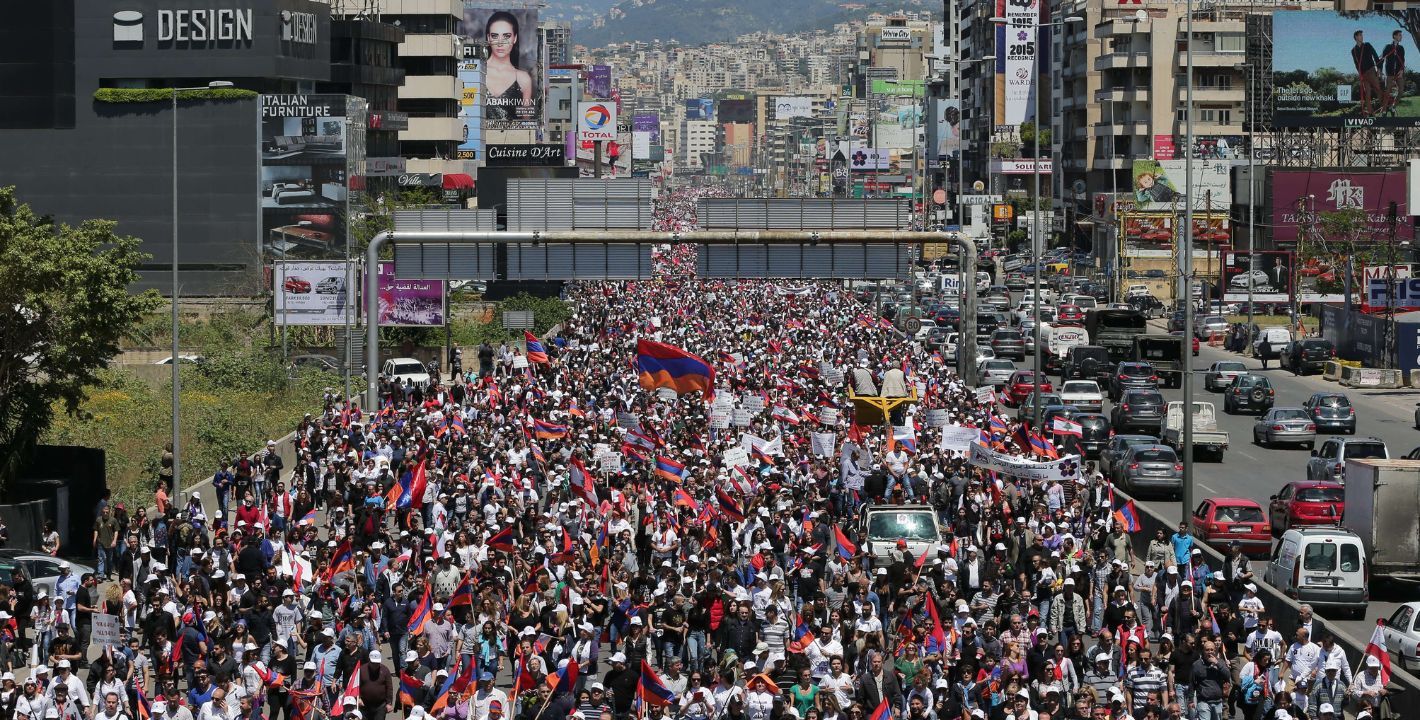Lebanon is home to a vibrant Armenian community. Where Armenians once numbered over 200,000 people, today there are an estimated 40,000–60,000, a numerical decline visible particularly among the youth. A significant portion of the Armenian community, especially the young, has left for Canada, France, and the United States, a brain drain that has weakened the community’s socioeconomic base.
Many factors have played a role in this, including Lebanon’s political and economic collapse in 2019–2020 and the Beirut port explosion of August 2020. Many Armenian-owned businesses were destroyed by the blast, which came on top of the economic crisis and hyperinflation. Similarly, geopolitical shifts in the Middle East have given rise to greater Turkish influence in Syria, which has threatened that of Armenians both in Syria and Lebanon. For all these reasons, Lebanon’s Armenians have sought renewed stability in their homeland. However, they require assistance in this endeavor.
Armenians have contributed significantly to Lebanon’s prosperity over the decades. They have been active in trade, crafts, agriculture, the arts, and continue to preserve the Western Armenian language through their religious, educational, and political institutions. The community’s presence in the diaspora has been preserved through charitable, cultural, and sports organizations. Many of these initiatives come from Armenia, such as the Hayastan All Armenian Fund and, previously, the Artsakh Fund. Student organizations and trade unions help preserve cultural specificity, as does Haigazian University, the only Armenian higher educational institution outside Armenia.
However, more support is needed from Armenia to ensure the sustainability of the Lebanese Armenian community. Armenia has an interest in helping, since the diaspora can be an asset by providing financial support, political advocacy, and cultural connections. The Armenian diaspora has lobbied actively for genocide recognition and advocated for Armenia’s interests internationally. These efforts can play a crucial role in strengthening Armenian diplomacy and security, and can contribute to increasing investment in the country and the development of its networks of relations.
Over the past 20 years, investment flows from Lebanon into the Armenian economy has totaled $527.7 million. Large companies with Lebanese capital operate in Armenia in diverse sectors such as law, consulting, jewelry, agriculture, and finance. Since 2020, over 250 specialists from the Armenian diaspora have joined the iGorts program, which seeks to draw Armenian professionals to work in Armenia’s public sector.
Lebanese Armenians are one of the most historically rooted Armenian diaspora communities. However, Armenia must acknowledge the dual reality of success and crisis within this community. Funding for Armenian schools, cultural centers, and newspapers is imperative as these institutions are struggling in the aftermath of Lebanon’s economic meltdown. Financial aid for Armenian businesses and funding for student exchanges between Lebanon and Armenia are crucial. There must be more opportunities for Armenian youths in Lebanon and Armenia to interact, learn from each other, and reinforce their mutual identity. There is a rich identity tied to Lebanese culture and history that is often missing in educational systems in Armenia.
Companies in Armenia must strive to hire Lebanese Armenians remotely, letting them earn a wage while allowing them to maintain their local distinctiveness and community. Armenians in Lebanon are not merely part of the diaspora, they form a support system for Armenian intellectual, cultural, and political life in the Middle East. In light of this, it is fair and strategically sensible for Armenia to invest in this community, as Lebanese Armenians often act as ambassadors of Armenian identity abroad. Their resilience is not just a matter of pride, it is a foundation upon which Armenia can build.
That is why Armenia must not treat Lebanese Armenians merely as remnants of genocide survivors, but as a community that is rich with potentially strategic partners. By taking proactive steps, Armenia can ensure that Lebanese Armenians remain lasting contributors to both the Lebanese and Armenian nations. Fostering economic growth, investment, and regional integration should be a priority.
Actors in the Lebanese community must also seek reform. They have to match resources to the contemporary needs of the youth, especially when it comes to education. Is Armenian education being offered in harmony with the tools that young people need today? Do schools and political parties encourage expansive thought, or do they replicate outdated methods that aim for self-preservation? Positive change is needed and must include all generations. Nor does this have to be limited to Armenians. Several communities and cultural groups regionally that have been through genocides, such as Kurds or Assyrians, have relied on processes of cultural preservation similar to Lebanon’s Armenians, and these have helped in their revitalization.
Historically, Armenian clubs and political parties have fostered belonging and leadership. Today, these organizations are less vibrant and face a loss of talent as well as institutional shortcomings. Many youths no longer see these spaces as relevant, because they do not fulfill their intellectual and social needs. For meaningful change to take place, external support and internal transformation must go hand in hand. The Armenian community in Lebanon cannot rely solely on outside help; it must also reimagine its institutions to prepare young Armenians for today’s world.
Armenians have lived in Lebanon for centuries, even before the genocide of 1915. This makes Lebanon a home for all, with Armenians having both an Armenian and a Lebanese identity that cannot be separated. As Lebanese Armenians, we are carriers of a unique blend of Armenian heritage and Lebanese culture, which makes it all the more essential that the Lebanese community remain strong and rooted in Lebanon.







